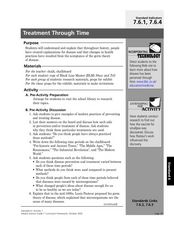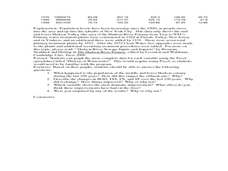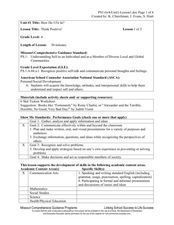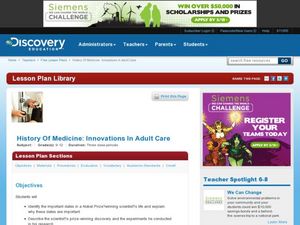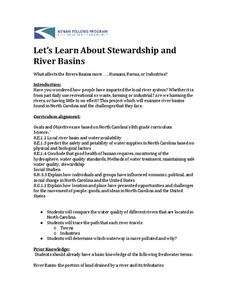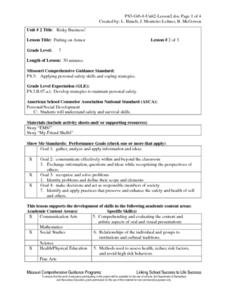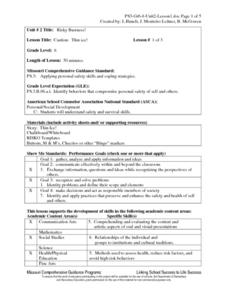Curated OER
Treatment Through Time
Seventh graders explore how disease prevention and treatment changed throughout history. In this life science lesson, 7th graders create a classroom exhibit about this topic. They present their project to visitors.
Curated OER
Fighting Fire with Fire
Students explore the effects of drugs and drug treatment programs in the science or health classroom.
Curated OER
AIDS, HIV, & Other Microbe Matters
Young scholars conduct inquiry-based research for basic information about microbes, infections, and HIV, the virus that causes AIDS. After gathering answers to their questions, students develop a presentation to post on their school's...
Curated OER
Pollution is Not a Solution
Students explore the environment by completing science worksheets in class. In this water conservation instructional activity, students identify ways water is used in our society and how we abuse the privilege. Students discuss methods...
Curated OER
Sustainable Southern Belize: Coral Health Lesson Plan
Fifth graders investigate coral reefs and the dangers they face by labeling and drawing. In this oceanography lesson, 5th graders view a PowerPoint presentation of photographs of coral reefs in Belize. Students investigate...
Curated OER
Historical Pollution in the Hudson: Part 2
Ninth graders practice how to format and enter data into an Excel spreadsheet, make a graph, and interpret graphed data. They recognize how the pollution in the Hudson River has changed over time, and explain the consequences of these...
Curated OER
Designing a Real Life Ecosystem!
Students research abiotic and biotic factors concerning the concept of an ecosystem. Record and analyze data collected. Write a lab report in proper and scientific format with thinking and analytical skills. Work as a cooperative team.
Curated OER
Mobile Phones
Investigate how mobile phones impact their lives through this technology lesson that has students discuss the history of the cell phone and research how cell phones are being used in third world countries. Students create a blog for new...
Curated OER
Think Positive!
Fourth graders are read a story in which they identify the positive and negative thinking. In groups, they are given a scenerio in which they change the negatives into a positive. They perform the scenerio to tthe class and discuss how...
Spreading Gratitude Rocks
Gratitude Bank
Money isn't the only type of currency that fills a piggy bank. Learners practice filling their banks with the the things that make them grateful. Pupils write about their talents, relationships, challenges, and life skills, making...
Curated OER
Water: P.O.V's Borders Picture Project
Through the use of digital cameras, this instructional activity shows students how to document how water is used in their local communities and explore how those uses impact the local environment.
Curated OER
Innovations In Adult Care
Students study scientists and the important Nobel Prize dates. In this investigative lesson students divide into groups and watch a program then complete a project.
Curated OER
Reshaping Body Image
Students determine how beliefs about body size and shape are shaped. They develop ideas about the acceptance of self and others with regard to body size and appearance by working in small groups. They view and discuss a PowerPoint...
Curated OER
Eco-Healthy Lunch
Students plan healthy lunches and how to dispose of their lunch waste. For this pre-field trip lesson, students and teachers plan healthy, nutritious lunches to bring on a field trip. They also discuss how to sort their garbage into the...
Kenan Fellows
Let's Learn About Stewardship and River Basins
What does it mean to be a good steward? Middle school environmentalists learn to care for their state's waterways through research, a guest speaker, and poster activity. Groups must locate and learn more about a river basin and the human...
Teach Engineering
Concentrated Solar Power
The seventh segment in an eight-part unit promotes the idea of concentrating the sun to increase the power of a photovoltaic panel. Pupils learn about devices used such as reflectors or lenses.
Curated OER
Goldilocks Revisited
Second graders investigate the story of "The Three Bears" while focusing on the character of Goldilocks. They answer key questions that are focused upon the development of positive feelings and reactions. Students discuss the possible...
Missouri Department of Elementary
Putting on Armor
Middle schoolers learn how to protect themselves from risky behaviors with a lesson that has them role play several scenarios and demonstrate ways that they might do to stay safe. Class members then use what they have learned to build a...
Missouri Department of Elementary
My Feelings
Encourage self-awareness with a lesson that challenges scholars to identify feelings—happy, sad, mad, and scared. Using a feelings thermometer, similar to that of a bar graph, pupils discuss how they would feel in specific scenarios then...
Curated OER
Putting On Armor
Seventh graders are read the story "EMS Code Blue" and asked to share what they would do in the different situations. As a class, they discuss the importance of getting help for mental or social problems and are given a list of resources...
Curated OER
Caution: Thin ice!
Sixth graders listen to story and respond with comments or questions. They brainstorm unsafe behaviors and randomly fill out templates with different risky behaviors listed on the board. They play RISKO, the Bingo type game.
Curated OER
I Am a First Grader
First graders participate in the review on the body information profile. They share why Freddie would or would not be a good student in first grade and then complete the activity sheet, "I Am a First Grader", writing things they do,...
Curated OER
The Origin of Life
In this origin of life worksheet, young scholars write answers to five questions. They describe characteristics of the first life forms and how scientists believe oxygen accumulated in the Earth's atmosphere.
Curated OER
What Is Important to Me?
Students respond to prompt with awareness of personal value of possessions. They list the criteria used to determine worth and value. They listen and ask questions or add comments and check their own measures of value with those the...


